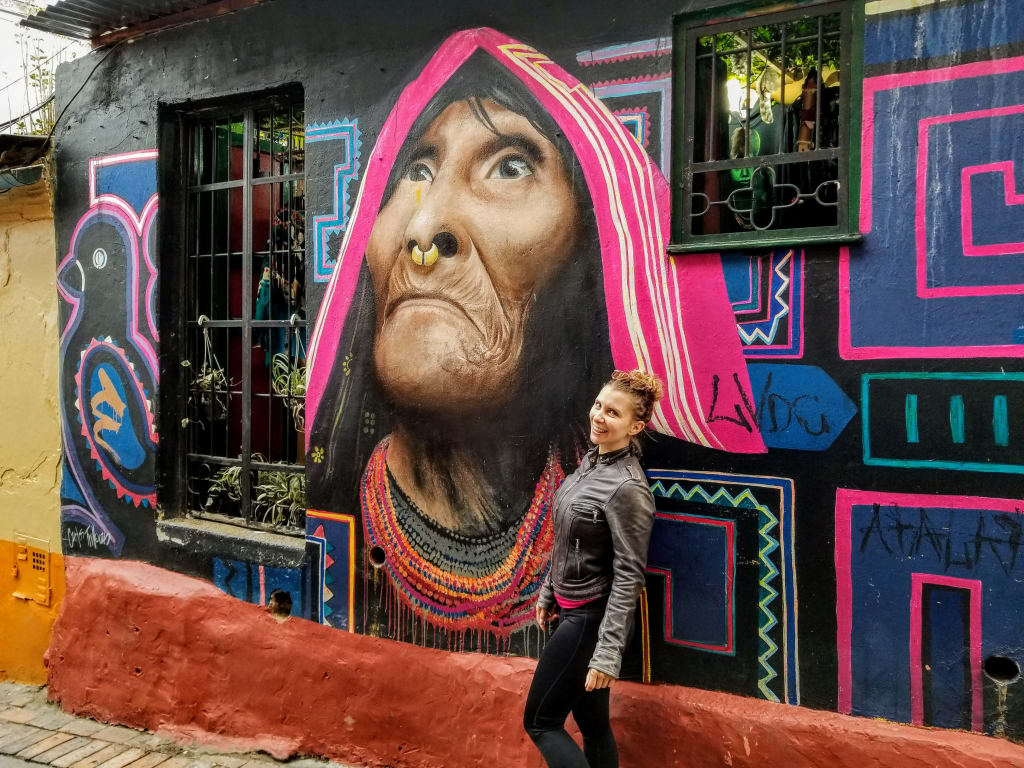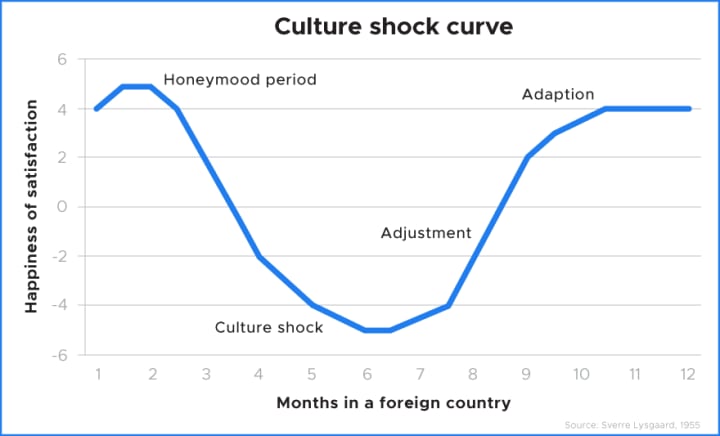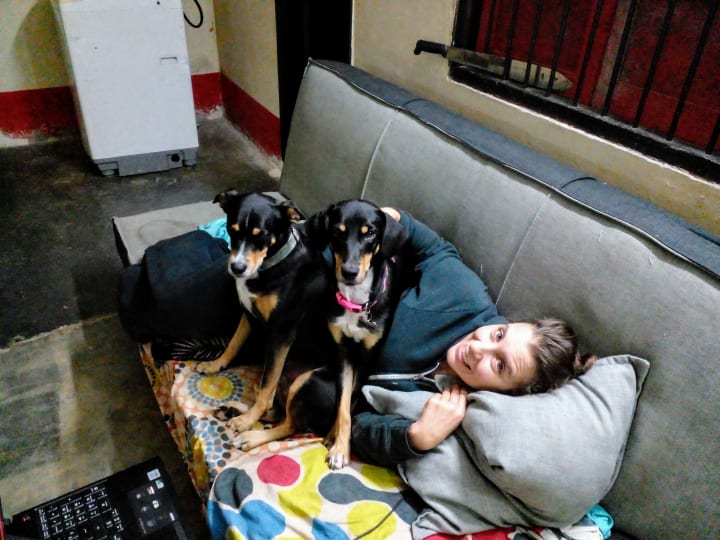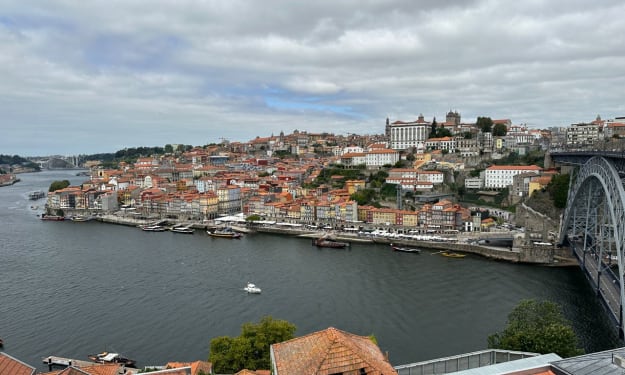How I navigated these stages of culture shock when I moved abroad
When I moved abroad four years ago, I had no idea what I was doing. I was open to any opportunity; a great adventure is what I got. Except it wasn’t until I settled in one country that I experienced actual culture shock.

When you are traveling around, moving in a group of others doing the same thing, it is still a protected bubble. I was in the backpacker’s group, doing the regular route most people follow. It was easy to avoid culture shock.
It was not until I started interacting with locals and staying places longer than most backpackers that it hit me, culture shock. I was thinking about this concept the other day, how since I returned from my US vacation, I have been at peace.
It is a very odd feeling for me, as most of my life has been an up-and-down rollercoaster of emotions, and now at least today, I feel a bit more at ease — a bit of a weird feeling. I am not used to this; I always worry about the other shoe dropping. It still takes up a bit of space, but it is far in the back and doesn’t get as much room as it used to.
Back to culture shock, when you are traveling around, you do not go past phase one of a country. Well, at least I did, according to what I have found online regarding this concept. It has always been one to fascinate me as I enjoy being anywhere new, and when I have seen what I want, I leave.
Hence no time to go into stages 2–4 of the culture shock curve.
So what the hell am I talking about?
I am referring to the Culture Shock Curve, which most of us who live abroad will experience, and I wanted to see now that I have been in one town for over a year if I have ridden the wave.

The honeymoon period is the first phase.
Yes, I have been here, and usually, when the honeymoon period is over in a country, I move on; I mean, don’t we all want only the good parts? You get the dopamine hit when you land in a new country and experience fresh food, the people, the buildings, and the smells.
The best part of travel, well, I think it can be the best parts of many things, new love, new puppies, new new new except when you stay long enough the new wears off. So it brings us to step 2 in the wave.
The culture shock phase also knows as the frustration stage.
Oh boy, now that I have decided to read about it, I have been in this phase in two countries — Argentina, where I also lived for a year, and here in Colombia.
I might have spent 4–6 months in this phase in Colombia because I have been in the same town where I was traveling in Argentina. I think this phase hit me around a month four living here.
I started to get angry at so many things; why can’t they take my order immediately? Menu del día again, I am sick of arepas; yes, I have been there. Why does the atm not work all the time? Why can’t anyone understand my Spanish?
Usually, at this time, I have left countries, annoyed and vowed to keep only the honeymoon memories. Except I stayed this time, and I am delighted I got over that stage. I have moved on to stage 3.
The adjustment stage.
Here in Colombia, I refer to it as the ¨no pasa nada¨ stage. I can see that I have shifted when I meet other travelers, and they are clearly in the frustration phase. I say to them let go; you will not change them; only you can change this situation.
It is the culture here, the laid back, yes, things take a while, and when you lean into it, it can be so relaxing. It is not up to me to fix how they do anything; it is up to me to adjust to their way of doing things.
I need to leave if I want it to be a different way. So, instead, I let it go. If the ATM does not work, I will try the next time in town. As no one cares if the electric bill is late, the internet bill is late, which I think is. The water bill gets paid when I see the lady, which is the flow of life here —¨ no pasa nada¨. I had adjusted so well that when I went home, all I craved was an arepa con queso y huevos! I have entered stage 4.
The acceptance stage.
Ok, maybe my 3 and 4 merged, as I realized to accept the ways of Colombia and my small town. The way they do it may never make sense, but it is how it is, which, to me, is fine and dandy.
I no longer feel the need to stress or worry. This stage is critical not to drive yourself bonkers when you live abroad, anywhere. It is the stage of true bliss and enjoyment to witness yourself in moments of peace and serenity — the actual acceptance of yourself and the ability to change and adapt to any situation.
The acceptance stage has always been challenging; as a healer and helper, I want to fix everyone and everything. However, the realization and acceptance that I do not have to play that role for me is priceless and has led me to lead a much more relaxed way of living.

I control what I can, which is my reactions to the world around me; I observe those around me and as the serenity prayer says.
God grants me the serenity to accept the things I cannot change, the courage to change the things I can, and the wisdom to know the difference.
I have read this prayer since I was in high school; my grandmother had it hanging over our kitchen table when I ate breakfast; I read it every morning until I graduated high school. Maybe it helped me get through a very rocky home life situation.
I think this curve can be applied to other areas of life.
The article was the inspiration for this article, disfruta tu día.
Originally pulished here.
About the Creator
sara burdick
I quit the rat race after working as a nurse for 16 years. I now write online and live abroad, currently Nomading, as I search for my forever home. Personal Stories, Travel and History
Reader insights
Outstanding
Excellent work. Looking forward to reading more!
Top insights
Easy to read and follow
Well-structured & engaging content
On-point and relevant
Writing reflected the title & theme
Expert insights and opinions
Arguments were carefully researched and presented
Compelling and original writing
Creative use of language & vocab
Heartfelt and relatable
The story invoked strong personal emotions
Masterful proofreading
Zero grammar & spelling mistakes
Eye opening
Niche topic & fresh perspectives
Excellent storytelling
Original narrative & well developed characters







Comments (19)
Excellent insight.
Thank you for sharing, great write up!
Great! I want to give you credit!
As travel writing should be
Thanks for sharing such a good story.
👍👍👍
👍👍👍👍👍👍👍👍👍
Very good sharing, thanks
Very good sharing, thanks
Very well written, thanks for sharing
👍👍👍
👍👍👍
👍
Why can you live so spontaneously, I admit I envy.🌹
This article is well written and deserves approval
Cultural and regional differences can make all the difference, and people who love to travel are the ones who go out of their way to do so.
Very well written article, couldn't agree more!
Very well written and very agreeable!
🌹
This comment has been deleted